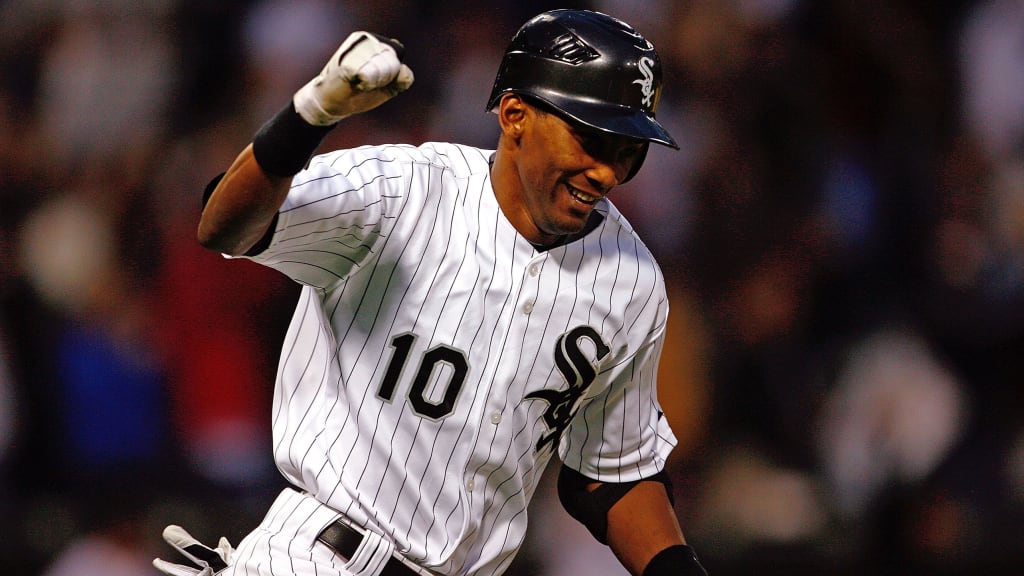
CHICAGO -- Alexei Ramirez¡¯s last Major League contest was a four-hit effort for the Rays in Texas on Oct. 2, 2016. It was not a bad way to close out a solid nine-year career for the shortstop who turns 39 in September.
But during a recent conversation with MLB.com, in the latest ¡°Where Are They Now¡± installment, Ramirez made it clear he still wants to play. Although Ramirez did much of his interview with the assistance of interpreter Billy Russo, he stated definitively in English on this particular topic, ¡°Alexei Ramirez is ready today, right now.¡±
¡°I¡¯ve been working out to stay in shape, trying to see if I [can] get another opportunity to play baseball in the Major Leagues,¡± said Ramirez through Russo. ¡°I¡¯m not happy with the way I left the game, because I know that I can do more. I just want to leave the game of baseball on my own and the way that I wanted.
¡°I know teams right now are looking for younger players and that¡¯s probably going to be a little tough for me to have another chance. But I¡¯m just getting ready and I really, really hope to have that chance.
¡°Hopefully, and that will be a dream come true, I can do that with the White Sox,¡± Ramirez said. ¡°But if not, whatever team I will be open to do it, because I still feel I have more in the tank and I can do more. Right now, it¡¯s just waiting and seeing what happens and seeing if there¡¯s another opportunity.¡±
Eight of Ramirez¡¯s nine big league seasons came with the White Sox, following seven in Cuba with Pinar del Rio. Ramirez hit 115 career home runs with 143 stolen bases, made one American League All-Star appearance and won two Silver Slugger Awards. He knocked out four grand slams during a 2008 campaign where he finished second to Evan Longoria in the AL Rookie of the Year Award voting. The father of five resides in Miami, where his son Alexei and his daughter Alexa play on the same baseball team.
MLB.com: What do you remember about the process leading you to the White Sox for the 2008 season?
Ramirez: I remember when I was in the Dominican Republic and I was keeping in contact with [Jose] Contreras. By that time, he was playing with the team. That was a big factor, a big influence, on my decision to sign with the team. I felt more comfortable and for me it was a very easy decision knowing that I had him here.
MLB.com: How many other teams had interest in you?
Ramirez: If my memory is right, I think it was Oakland and Tampa, but the White Sox had Contreras playing with them at that time and for me it was a no-brainer to sign with the team because of that.
Not just because of that, but I also knew the tradition of the Cuban players with the White Sox and with the team. I knew that Minnie Minoso, who for me was like a father figure, he played with them and I wanted to be with them.
MLB.com: Did you know Minoso before joining the White Sox?
Ramirez: No, not personally. But I was in Cuba, I heard a lot of stories about him and about the things that he did in the Majors. Not just him, but also Tony Oliva [and] Luis Tiant.
It was when I came to the U.S. and I joined the team that I had the chance to meet him and it was a real pleasure. Every time, every chance that I had with him, it was special. Just our conversations in the clubhouse were something very, very special.
MLB.com: The White Sox have Cuban countrymen such as Jos¨¦ Abreu, Yo¨¢n Moncada and Luis Robert on the roster and Contreras working in the organization. Does that Cuban connection make a difference to young players from Cuba when looking at potential teams?
Ramirez: I think so, because you have seen the history of the team and that¡¯s a strong relationship the team has built with the Cuban players, with the Cuban tradition. Not just now with Moncada or Robert or Abreu, but even in the past with Contreras, with myself [and] with Minnie.
The Cuban people have to be pretty grateful to the White Sox for the way they have been taking care of Cuban players throughout its history. Definitely that¡¯s something that¡¯s going to weigh on the decision any Cuban player would have to make whenever he decides where to play or when to play.
MLB.com: You were known for excellent work at shortstop. But what was it like to make your 2008 debut in center field in Cleveland?
Ramirez: It was a nice story. I remember I was in the Dominican Republic and I had a conversation with my agent, and Ozzie Guillen was the manager at that time, and Ozzie asked me, you know how he is. He asked me directly ¡®Hey, what position do you play?¡¯ And I told him shortstop. And he said ¡®No. Shortstop, no. We have [Orlando] Cabrera there. Pick another position.¡¯ I said, ¡®Well center field.¡¯
I said center field because that was a position I used to play in Cuba and then he said, ¡®Yeah, OK. You are going to play there.¡¯ But when the season started and throughout the season, [Juan] Uribe had an injury at second base and then that opened the possibility for me to play that position and that was nice having the experience. I told Ozzie during that conversation what mattered to me was just to play baseball. It doesn¡¯t matter what position I was playing.
MLB.com: Did you like the ¡°Cuban Missile¡± nickname given to you by Ozzie?
MLB.com: Yes, of course! I liked that nickname because I think he put it on me for the combination of tools I had: my speed, my ability to hit for power and average. I felt very blessed to have the chance to play for a Latino manager like him and to be able to build that relationship.
He was like a brother, like a father, like a mentor for me. I was just glad for that. I know that not too many Latino players have someone like him when they are starting their career. I was very fortunate to have him as a manager.
MLB.com: Was 2008 a crazy season for you: your rookie season and needing Game 163 to make the playoffs?
Ramirez: For every baseball player, especially the Latino ones, Cuban, the Dominicans, the Venezuelans, when you are playing baseball and you come to this country, your dream beyond making it to the Majors is just to play in a playoff game or series. And I just feel very fortunate and blessed that I had the chance in my first year in Major League Baseball. I know how hard it is.
MLB.com: You hit a grand slam to beat Detroit in a makeup game the day after the 2008 regular season ended, basically sending the White Sox to the AL Central tiebreaker, the Blackout Game. Is that grand slam your greatest White Sox moment?
Ramirez: I had many good moments with the White Sox. But I think that grand slam was the one that marked my career. Just because the moment and the situation, when I hit that grand slam, the team was able to win the game and then to face the Twins in the next game and I remember like it was today that game against the Twins.
It was Jim Thome with his homer, Ken Griffey Jr. with his throw to home plate, Bobby Jenks closing the game. I remember all of that very vividly. That year was very special for me.
MLb.com: Have you watched the 2009 Mark Buehrle perfect game replay, and relived the ¡°Alexei? Yes!¡± moment on assisting with the game¡¯s 27th out?
Ramirez: I have seen the video of the game, but I remember that after the 26th out, I was saying to myself, ¡®Please don¡¯t hit it by me,¡¯ because I had an ankle injury. And then as soon as I saw the ground ball, I said ¡®Oh [no].¡¯ Then I have to run to it and just made the play. That¡¯s a fun fact.

